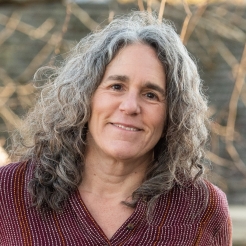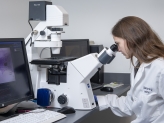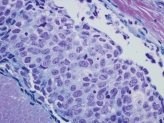Ruthann Rudel, MS

Ruthann Rudel leads Silent Spring Institute’s exposure and toxicology research programs focusing on endocrine active chemicals and on the mechanisms by which chemicals may influence breast cancer risk. She also directs Silent Spring's Safer Chemicals Program, which is developing new cost-effective ways of screening chemicals for their effects on the breast.
Her recent study—recognized by the National Institute of Environmental Health Sciences (NIEHS) as one of the most influential papers of 2021—identified 296 potential breast carcinogens based on their ability to increase estradiol and progesterone synthesis in the H295R in vitro steroidogenesis assay. Her work in toxicology includes reviews of early life exposure to chemicals that alter mammary gland development and implications for testing protocols and risk assessment. Her 2014 review in Environmental Health Perspectives identified methods for detecting metabolites of 100 prevalent mammary carcinogens for use in biomonitoring and in breast cancer cohort studies. She has published on toxicology and risk assessment for metals, indoor air pollutants, and endocrine disruptors.
Rudel has made major contributions to understanding personal exposures to endocrine disruptors and breast carcinogens, including using biomonitoring, metabolomics, and environmental monitoring approaches. She is leading biomonitoring efforts in studies funded by NIEHS and the California Breast Cancer Research Program (CBCRP). In the Women Workers Biomonitoring Collaborative, she is creating a biospecimen archive for women in various occupations (firefighting, nursing, office work) and using non-targeted approaches to identify novel exposures, and metabolomics to identify early effect markers. Her projects seek to identify biological and environmental measures of chemical exposure suitable for integration into existing breast cancer cohort studies, with target chemicals selected based on cancer bioassays and other experimental data.
She directed Silent Spring’s widely-cited Household Exposure Study, which was described by Environmental Science & Technology as the “most comprehensive analysis to date” of exposures in homes. Rudel expanded the initial study to include indoor and outdoor air, house dust, urine, blood, and self-reported exposure data from 250 participants in California, Massachusetts, Ohio, and Louisiana, leading to at least 20 peer-reviewed, exposure-related papers. Major contributions include the identification of previously unrecognized sources of ongoing PCB exposures in homes and the discovery that PBDE exposures are higher in California due to the state’s unique furniture flammability standards. The U.S. Environmental Protection Agency (EPA) is now using these data to validate high-throughput exposure models for consumer product chemicals.
Rudel’s research has been conducted in collaboration with co-investigators at Harvard University, Brown University, Tufts University, University of California, Berkeley, University of Florida, the U.S. Geological Survey, and the U.S. Centers for Disease Control and Prevention. She is an adjunct Research Associate in the Brown University Department of Epidemiology. She served on EPA’s Scientific Advisory Committee on Chemicals for the Toxic Substances Control Act (TSCA), the National Academy of Sciences panel Unraveling Low Dose Toxicity: Case Studies of Systematic Review of Evidence, the U.S. National Toxicology Program Board of Scientific Counselors, as well as the TSCA and Regulatory Affairs and Legislative Assistance Committees of the Society of Toxicology. She has participated in environmental regulatory reviews for EPA, Health Canada, Toxicology Excellence for Risk Assessment, and others, and serves as an ad hoc manuscript reviewer for such journals as Environmental Science & Technology and Environmental Health Perspectives.
Rudel earned her B.A. in chemistry and neuroscience from Oberlin College, and an M.S. in environmental management and policy from Tufts. Before joining Silent Spring, she worked as a consultant at Gradient Corporation.
Projects
Publications & Presentations
Franklin, E.T., K. Favela, R. Spies, J.M. Ranger, R.A. Rudel. 2026. Identifying chemicals of health concern in hair extensions using suspect screening and non-targeted analysis. Environment & Health. DOI: 10.1021/envhealth.5c00549
Knox, K.E., J.L. Ohayon, E. Carrera, R. A. Rudel and R. Morello-Frosch. 2025. Breast cancer-related occupational exposures facing immigrant women. Journal of Exposure Science & Environmental Epidemiology. doi: 10.1038/s41370-025-00808-9
Knox, K.E., D. Abrahamsson, J. Trowbridge, J.-S. Park, M. Wang, E. Carrera, L. Hartmayer, R. Morello-Frosch, and R. A. Rudel. 2025. Application of a Non-targeted Biomonitoring Method to Characterize Occupational Chemical Exposures of Women Nurses Relative to Office Workers. Environmental Science & Technology. doi: 10.1021/acs.est.4c14790
Shakti, R., J.E. Kay, E.T. Franklin, J.L. Ohayon, J.G. Brody, M.B. Terry, R.A. Rudel. 2024. Why the UN treaty on plastics can reduce early onset cancers. Environmental Science & Technology Letters. doi: 10.1021/acs.estlett.4c00942
Knox, K.E., M.R. Schwarzman, R.A. Rudel, C. Polsky, and R.E. Dodson. 2024. Trends in NHANES biomonitored exposures in California and the U.S. following enactment of California’s Proposition 65. Environmental Health Perspectives. 132(10). doi: 10.1289/EHP13956
Cardona B., K.M. Rodgers K.M., J. Trowbridge, H.B. Buren, R.A. Rudel. 2024. Breast Cancer-Related Chemical Exposures in Firefighters. Toxics. 12(10):707. doi: 10.3390/toxics12100707
Kay, J.E., J.G. Brody, M. Schwarzman, R.A. Rudel. 2024. Application of the Key Characteristics framework to identify potential breast carcinogens using publicly available in vivo, in vitro, and in silico data. Environmental Health Perspectives. https://doi.org/10.1289/EHP13233
Ohayon, J.L., S. Rasanayagam, R.A. Rudel, S. Patton, H. Buren, T. Stefani, J. Trowbridge, C. Clarity, J.G. Brody, R. Morello-Frosch. 2023. Translating community-based participatory research into broadscale sociopolitical change: insights from a coalition of women firefighters, scientists, and environmental health advocates. Environmental Health. https://doi.org/10.1186/s12940-023-01005-7
Knox, K.E., R.E. Dodson, R.A. Rudel, C. Polsky, and M.R. Schwarzman. 2023. Identifying toxic consumer products: Novel data set reveals air emissions of potent carcinogens, reproductive toxicants, and developmental toxicants. Environmental Science & Technology. 57 (19), 7454-7465. doi: 10.1021/acs.est.2c07247
Borrel, A., Rudel, R. 2022. Cheminformatics analysis of chemicals that increase estrogen and progesterone synthesis for a breast cancer hazard assessment. Scientific Reports. 12, 20647. doi: 10.1038/s41598-022-24889-w
Kay J.E., B. Cardona, R.A. Rudel, L.N. Vandenberg, A.M. Soto, S. Christiansen, L.S. Birnbaum, S.E. Fenton. 2022. Chemical Effects on Breast Development, Function, and Cancer Risk: Existing Knowledge and New Opportunities. Current Environmental Health Reports. 9, 535–562. doi: 10.1007/s40572-022-00376-2.
Tanabe, S, J. O’Brien, K. E. Tollefsen, Y. Kim, V. Chauhan, C. Yauk, E. Huliganga, R. A. Rudel, J. E. Kay, J. S. Helm, D. Beaton, J. Filipovska, I. Sovadinova, N. Garcia-Reyero, A. Mally, S. S. Poulsen, N. Delrue, E. Fritsche, K. Luettich, C. La Rocca, H. Yepiskoposyan, J. Klose, P. H. Danielsen, M. Esterhuizen, N. R. Jacobsen, U. Vogel, T.W. Gant, I. Choi, R. FitzGerald. 2022. Reactive Oxygen Species in the Adverse Outcome Pathway Framework: Toward Creation of Harmonized Consensus Key Events. Frontiers of Toxicology. 6:4:887135. doi: 10.3389/ftox.2022.887135
Rudel, R.A., B. Cardona, A. Borrel, J.E. Kay. 2022. Response to “Comment on ‘Application of an in Vitro Assay to Identify Chemicals That Increase Estradiol and Progesterone Synthesis and Are Potential Breast Cancer Risk Factors’”. Environmental Health Perspectives. 130(5):58003. doi: 10.1289/EHP11400
Su, Y., J. Santucci-Pereira, N.M. Dang, J. Kanefsky, V. Rahulkannan, M. Hillegass, S. Joshi, H. Gurdogan, Z. Chen, V. Bessonneau, R. Rudel, J. Ser-Dolansky, S.S. Schneider, J. Russo. 2022. Effects of Pubertal Exposure to Butyl Benzyl Phthalate, Perfluorooctanoic Acid, and Zeranol on Mammary Gland Development and Tumorigenesis in Rats. International Journal of Molecular Sciences. 23(3):1398. doi: 10.3390/ijms23031398
Trowbridge, J., R. Gerona, M. McCaster, K. Ona, C. Clarity, V. Bessonneau, R. Rudel, H. Buren, R. Morello-Frosch. 2022. Organophosphate and Organohalogen Flame-Retardant Exposure and Thyroid Hormone Disruption in a Cross-Sectional Study of Female Firefighters and Office Workers from San Francisco. Environmental Science & Technology. 56 (1), 440-450. doi: 10.1021/acs.est.1c05140.
Clarity, C., J. Trowbridge, R. Gerona, K. Ona, M. McMaster, V. Bessonneau, R. Rudel, H. Buren and R. Morello-Frosch. 2021. Associations between polyfluoroalkyl substance and organophosphate flame retardant exposures and telomere length in a cohort of women firefighters and office workers in San Francisco. Environmental Health. 20 (97). doi: 10.1186/s12940-021-00778-z
Cardona, B. and R.A. Rudel. 2021. Application of an in vitro assay to identify chemicals that increase estradiol and progesterone synthesis and are potential breast cancer risk factors. Environmental Health Perspectives. 129(7):77003. doi: 10.1289/EHP8608
Dodson, R.E., R.W. Setzer, J.D. Spengler, J.G. Brody, R. A. Rudel &. J.G. Cedeño Laurent. 2021. Influence of living in the same home on biomonitored levels of consumer product chemicals. Journal of Exposure Science & Environmental Epidemiology. 32, 885–891. doi: 10.1038/s41370-021-00368-8
Bessonneau, V., R.R. Gerona, J. Trowbridge, R. Grashow, T. Lin, H. Buren, R. Morello-Frosch, R.A. Rudel. 2021. Gaussian graphical modeling of the serum exposome and metabolome reveals interactions between environmental chemicals and endogenous metabolites. Scientific Reports. 11: 7607. doi: 10.1038/s41598-021-87070-9
Kripke M., J.G. Brody, E. Hawk, A.B. Hernandez, P.J. Hoppin, M.M. Jacobs, R.A. Rudel, T.R. Rebbeck. 2020. Rethinking Environmental Carcinogenesis. Cancer Epidemiology, Biomarkers & Prevention. 29(10): 1870-1875. doi: 10.1158/1055-9965.EPI-20-0541
Dodson, R.E., K. E. Boronow, H. Susmann, J.O. Udesky, K.M. Rodgers, D. Weller, M. Woudneh, J.G. Brody, R.A. Rudel. 2020. Consumer behavior and exposure to parabens, bisphenols, triclosan, dichlorophenols, and benzophenone-3: Results from a crowdsourced biomonitoring study. International Journal of Hygiene and Environmental Health. 230:113624. doi: 10.1016/j.ijheh.2020.113624
Rodgers, K.M., A. Covaci, G. Poma, K. Knox, J.G. Allen, J. Cedeno-Laurent, R.A. Rudel, R.E. Dodson. 2020. Flame retardant concentrations are lower in college spaces meeting the new furniture flammability standard TB117-2013. Environmental Science & Technology Letters. 7 (11), 833-839. doi: 10.1021/acs.estlett.0c00483
Cardona, B. and R.A. Rudel. 2020. US EPA's regulatory pesticide evaluations need clearer guidelines for considering mammary gland tumors and other mammary gland effects. Molecular and Cellular Endocrinology. 518:110927. doi: 10.1016/j.mce.2020.110927
Helm J.S. and R.A. Rudel. 2020. Adverse outcome pathways for ionizing radiation and breast cancer involve direct and indirect DNA damage, oxidative stress, inflammation, genomic instability, and interaction with hormonal regulation of the breast. Archives of Toxicology. 94, 1511–1549. doi: 10.1007/s00204-020-02752-z
Trowbridge, J., R.R. Gerona, T. Lin, R.A. Rudel, V. Bessonneau, H. Buren, R. Morello-Frosch. 2020. Exposure to Perfluoroalkyl Substances in a Cohort of Women Firefighters and Office Workers in San Francisco. Environmental Science & Technology. 54 (6), 3363-3374. doi: 10.1021/acs.est.9b05490
Grashow, R., V. Bessonneau, R.R. Gerona, A. Wang, J. Trowbridge, T. Lin, H. Buren, R.A. Rudel, R. Morello-Frosch. 2020. Integrating exposure knowledge and serum suspect screening as a new approach to biomonitoring: An application in firefighters and office workers. Environmental Science & Technology. 54 (7), 4344-4355. doi: 10.1021/acs.est.9b04579
Boronow, K.E., L.J. Perovich, L. Sweeney, J.S. Yoo, R.A. Rudel, P. Brown, J.G. Brody. 2020. Privacy Risks of Sharing Data from Environmental Health Studies, Environmental Health Perspectives. 128(1):17008. doi: 10.1289/EHP4817
Bessonneau, V., and R.A. Rudel. 2020. Mapping the Human Exposome to Uncover the Causes of Breast Cancer. International Journal of Environmental Research and Public Health. 17(1): 189. doi: 10.3390/ijerph17010189
Udesky, J.O., R.E. Dodson, L.J. Perovich, R.A. Rudel. 2019. Wrangling environmental exposure data: guidance for getting the best information from your laboratory measurements. Environmental Health. 18: 99. doi: 10.1186/s12940-019-0537-8
Susmann, H.P., L.A. Schaider, K.M. Rodgers, R.A. Rudel. 2019. Dietary Habits Related to Food Packaging and Population Exposure to PFASs, Environmental Health Perspectives. 127 (10). doi: 10.1289/EHP4092
Rodgers, K.M., L.R. Swetschinski, R.E. Dodson, H.R. Alpert, J.M. Fleming, and R.A. Rudel. 2019. Health Toll from Open Flame and Cigarette-Started Fires on Flame-Retardant Furniture in Massachusetts, 2003–2016. American Journal of Public Health. 109, 1205-1211. doi: 10.2105/AJPH.2019.305157
Dorman D.C., W. Chiu, B.F. Hales, R. Hauser, K.J. Johnson, E. Mantus, S. Martel, K.S. Robinson, A.A. Rooney, R. Rudel, S. Sathyanarayana, S.L. Schantz, K.M. Waters. 2018. Polybrominated diphenyl ether (PBDE) neurotoxicity: a systematic review and meta-analysis of animal evidence. Journal of Toxicology and Environmental Health, Part B Critical Reviews. 21(4): 269-289. doi: 10.1080/10937404.2018.1514829
Dorman D.C., W. Chiu, B.F. Hales, R. Hauser, K.J. Johnson, E. Mantus, S. Martel, K.S. Robinson, A.A. Rooney, R. Rudel, S. Sathyanarayana, S.L. Schantz, K.M. Waters. 2018. Systematic reviews and meta-analyses of human and animal evidence of prenatal diethylhexyl phthalate exposure and changes in male anogenital distance. Journal of Toxicology and Environmental Health, Part B Critical Reviews. 21(4): 207-226. doi: 10.1080/10937404.2018.1505354
Grashow, R.G., V.Y. De La Rosa, S.M. Watford, J.M. Ackerman, R.A. Rudel. 2018. BCScreen: A gene panel to test for breast carcinogenesis in chemical safety screening. Computational Toxicology. 5:16-24. doi: 10.1016/j.comtox.2017.11.003
Schwarzman M.R., J.M. Ackerman, S.H. Dairkee, S.E. Fenton, D. Johnson, K.M. Navarro, G. Osborne, R.A. Rudel, G.M. Solomon, L. Zeise, S. Janssen. 2015. Screening for chemical contributions to breast cancer risk: A case study for chemical safety evaluation. Environmental Health Perspectives, 123(12):1255-1264. doi:10.1289/ehp.1408337
Rudel, R.A., J.M. Ackerman, K.R. Attfield, J.G. Brody. 2014. New Exposure Biomarkers as Tools for Breast Cancer Epidemiology, Biomonitoring, and Prevention: A Systematic Approach Based on Animal Evidence. Environmental Health Perspectives, 122(9):881-895. doi:10.1289/ehp.1307455
Rudel, R.A., L. Perovich. 2012. Accurate Risk-Based Chemical Screening Relies on Robust Exposure Estimates. Toxicological Sciences. 128(1):295–296. doi.org/10.1093/toxsci/kfs143
Rudel, R.A, S.E. Fenton, J.M. Ackerman, S.Y. Euling, S.L. Makris. 2011. Environmental Exposures and Mammary Gland Development: State of the Science, Public Health Implications, and Research Recommendations. Environmental Health Perspectives, 119(8):1053-6161. doi:10.1289/ehp.1002864
Rudel, R.A, J.M. Gray, C.L. Engel, T.W. Rawsthorne, R.E. Dodson, J.M. Ackerman, J. Rizzo, J.L. Nudelman, J.G. Brody. 2011. Food packaging and bisphenol A and bis(2-ethyhexyl) phthalate exposure: Findings from a dietary intervention. Environmental Health Perspectives, 119(7):914-20. doi:10.1289/ehp.1003170
Zota, A.R., R.A. Rudel, R.A. Morello-Frosch, J.G. Brody. 2008. Elevated House Dust and Serum Concentrations of PBDEs in California: Unintended Consequences of Furniture Flammability Standards? Environmental Science and Technology, 42(21):8158–8164. doi:10.1021/es801792z
Rudel, R.A., K. R. Attfield, J. Schifano, J.G. Brody. 2007. Chemicals causing mammary gland tumors in animals signal new directions for epidemiology, chemicals testing, and risk assessment for breast cancer prevention. Cancer, 109 (S12): 2635-2666. doi: 10.1002/cncr.22653



